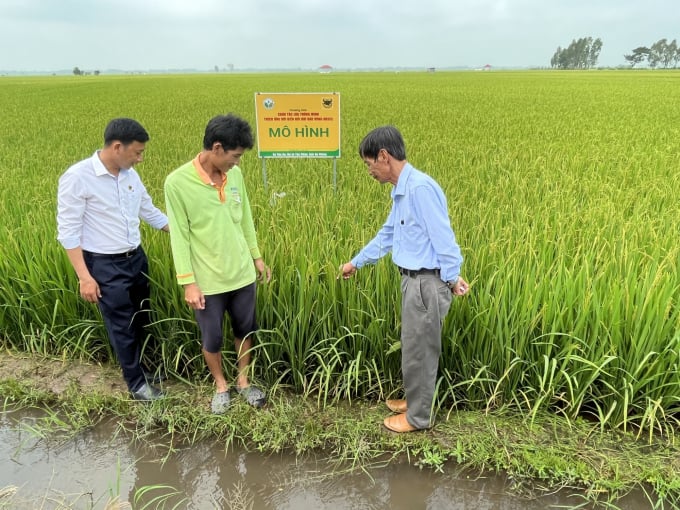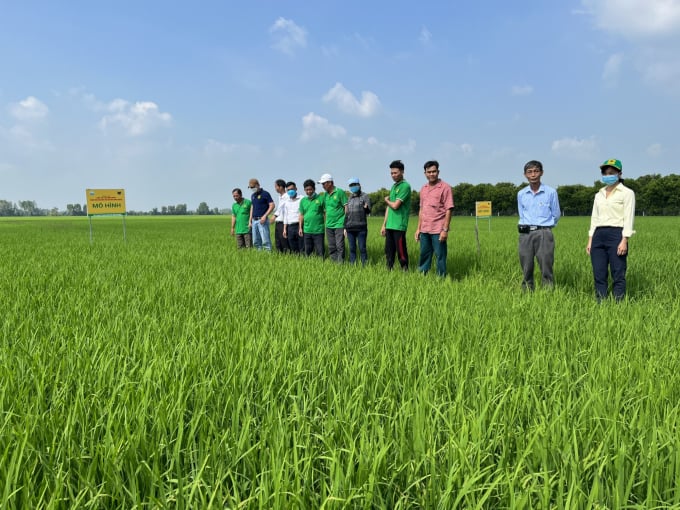November 27, 2025 | 23:46 GMT +7
November 27, 2025 | 23:46 GMT +7
Hotline: 0913.378.918
November 27, 2025 | 23:46 GMT +7
Hotline: 0913.378.918
The National Centre for Agricultural Extension and Binh Dien Fertilizer Joint Stock Company signed a cooperation agreement on a smart rice farming programme in the Mekong Delta in early November 2020 in Vi Thanh City, Hau Giang Province.
During the winter-spring crop 2021 - 2022, the programme was implemented when the outbreak of the COVID-19 pandemic hit the Mekong Delta. However, the programme was still implemented on a large scale, with a total of 24 models in 13 provinces, and cities in the region.
Le Quoc Thanh, Director of the National Centre for Agriculture and Rural Development emphasised that the programme helped to further improve the technical skills of technical staff, helping farmers and cooperatives approach and learn effective farming solutions.
The programme also contributed to gradually building good groups of farmers, boldly applying new farming solutions and acting as a bridge to transfer rice farming techniques in localities, he said.
In addition, smart farming solutions applied in the programme realised Vietnam's contribution to the United Nations Framework Convention on Climate Change (specifically by domestic resources) as Vietnam planned to reduce its total greenhouse gas emissions by 9 per cent compared to the business-as-usual scenario and increase its contribution up to 27 per cent by 2030.

Smart rice farming model in Tan Chau, An Giang. Photo: Do Hung.
The advanced technical groups in the Smart Rice Farming Programme are also contributing to the implementation of the goals and tasks of the agricultural extension system in agricultural production nationwide - the plan to restructure the agricultural sector for the period 2021 - 2025, specifically building an extension model based on responsible agricultural production, ensuring transparency and sustainability.
Ngo Van Dong, General Director of Binh Dien Fertilizer Joint Stock Company, said that the smart rice farming program in the Mekong Delta in winter-spring crop 2021 - 2022 brought many remarkable results, especially in the situation that the price of agricultural inputs increased, the price of rice decreased, and the weather and diseases were unfavorable for rice farming.
“24 models achieved very good results,” he said.
“Farmers participating in the model have boldly applied many smart farming solutions to their fields, including the application of mechanised sowing methods such as cluster sowing, transplanting, row sowing that helps to reduce the number of seeds to 75.7 kg/ha on average, lower than the control (112 kg/ha) and the current mass production is about 150 kg/ha", Dong added.
Le Thanh Tung, Deputy Director of the Department of Crop Production said that the programme brought practical effects to farmers in the Mekong Delta. The program built a common smart rice farming process for the whole region. In addition, each province proposed its farming process based on the general process and adjusted it to suit local realities.
"We must consider this as a rice production process for the entire Mekong Delta region and expand it throughout the country," emphasised Tung.

Smart rice farming model in Long Phu District, Soc Trang. Photo: Do Hung.
According to the final report of the programme, the application of Dau Trau fertiliser as recommended was very effective compared to the control. Most of the models gave higher yields than the control ones. The fertilizer helps improve soil, create a healthy soil environment and provide early nutrition, combined with sparse sowing proved to be very effective in farming conditions in the models in the winter-spring crop 2021 - 2022. The average optimum yield in 24 models increased by 870 kg/ha compared to the control, thereby helping to increase profits by over VND5.2 million/ha.
Prof. Dr. Nguyen Bao, Head of the Scientific Advisory Board of Binh Dien Fertilizer Joint Stock Company, said: To effectively reduce seeds, farmers need to focus on carefully tilling the soil, taking measures to handle toxic substances in the soil such as alum, salinity, and organic poisoning as well as applying irrigation and IPM management measures.
The work helped reduce farming costs, contributing to increased profits, as well as reducing the number of times pesticide spraying to protect the environment and create safer rice products.
The models not only helped update the skills of farmers who joined the models but also have a great impact on neighboring farmers. The programme will continue to be implemented in the summer-autumn rice crop of 2022 in the Mekong Delta.
Translated by Hien Anh

(VAN) According to Mr. Vo Minh Thanh, Director of the Tay Ninh Department of Agriculture and Environment, Resolution 57 has created a new development pathway for the locality, shifting from traditional toward modern agriculture.
/2025/11/26/4909-2-154329_878.jpg)
(VAN) Pearl grouper farming in HDPE cages not only delivers economic efficiency but also contributes to protecting the environment, creating jobs, and promoting marine-based experiential tourism.

(VAN) The model of making a living under the forest canopy through the agroforestry system in Van Son commune, Bac Ninh province, is expected to generate an annual income of approximately VND 30 million/ha.

(VAN) Many enterprises in Can Tho are harnessing natural energy and reducing greenhouse gas emissions in their production processes, thereby contributing to the promotion of a sustainable green transition.
/2025/11/24/3536-2-112800_176.jpg)
(VAN) Dong Nai now has tens of thousands of hectares of forests certified for sustainable management, and this area will continue to be expanded in the coming period.

(VAN) Vinh Ha hamlet (Dai Xuyen commune, Hanoi) is shifting away from small-scale farming as households adopt bioscurity into their breeder chicken models.

(VAN) Heavy rains make aquatic species more vulnerable to disease. Proactive water management and high-tech systems help farmers prevent outbreaks and protect yields.